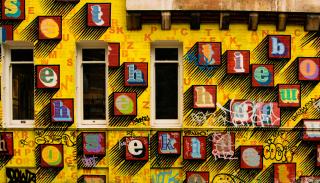
Breadcrumbs navigation
A-Z of IR: U is for 'United Nations' and V is for 'Veto'
Inspired by the British Academy’s focus on Engaging the Public with Humanities and the Social Sciences (2023), in October 2024, Adrian Gallagher (Leeds) launched an A-Z in International Politics online and free of charge. This 26 part series over 26 weeks introduces key concepts such as A is for Anarchy, B for Balance of Power, C for Cooperation and so forth. They are released on Instagram (Prof_Politics), TikTok (Professor_Politics), LinkedIn, and YouTube (@ProfessorGallagher).
Last month alone this series generated more than 64,000 views and 3500 interactions on Instagram and 8000 views on TikTok. Over the last few months YouTube has had over 1000 views, and LinkedIn around 10,000 views. In total there has been over half a million views across all social media platforms since the conception of this series.
This week we look at the letters 'U' and 'V'.
U is for 'United Nations'
As we celebrate the 80th birthday of the United Nations, Gallagher answers the question - what exactly is the United Nations?
Rewarding power, with five VIP members of the general council, including China and the US, giving themselves a veto and permanent seats in the security council, many regard the UN as a colonial project. For example, with more African countries in the world than there countries in the UN when it was formed, critics argue it is a failing that there is there not a single African State with a seat on the permanent security council.
On the other side, supporters argue for the UN by bringing our understanding back to power. With the Security Council’s main objective being to maintain international peace and security, should a weaker state be able to vote in favour of war without helping with maintaining international security? However, with 70,000 peacekeepers stationed worldwide, it is clear that the Global South plays a huge role in this effort.
When we look at the UN it is important to understand the multitude of specialist agencies that operate under the UN, such as the World Food Program and UNICEF who carry out unfathomably important work protecting the lives of some of the most vulnerable people in our world. For example, in Sudan, 600,000 people are at risk of starving to death. The World Food Programme was doing its best to tackle this but had to suspend activities due to an attack with armed groups - a failure of the permanent five?
We need the UN to help enforce international peace but the five permanent members of the Security council are acting irresponsibly, failing to carry out international protection and security. A breakdown of the UN can lead us to increased war and conflict, despite states becoming more powerful they risk doing so in a more violent world. Global order studies show to us that powerful leaders often fail to recognise that they need to use the UN to carry the burden of power in the anarchical realm.
V is for 'Veto'
On 20 November 2024, 14 out of 15 governments on the UN security council voted for an immediate ceasefire in Gaza. The US voted against, and using its veto, caused the resolution to fail. The veto is a complex power bestowed on permanent members of the security council – how does it work exactly?
When the UN was created, the five permanent members of the security council, France, the UK, the US, China and the USSR gave themselves the veto on the principle of unanimity. To have a resolution pass they should all have to agree. With some of the P5 members originally wanting to have the veto revoked if your state was involved in the conflict, the USSR was against this and ultimately the veto was left ‘unchecked’ under article 273 in the UN charter.
Used 325 times since its conception, with Russia leading the way with 161 uses, there has to be recognition to ‘silent vetoes’ in which resolutions are tabled before discussion as members know the veto will be used against it.
The veto is effectively a security shield not just for permanent members but also for their allies. The US has used it to protect Israel on multiple occasions and during the Syrian crisis Russia vetoed 18 times to protect Assad. However, the UK and France have not used their veto rights since 1989, when they protected the US after its invasion of Panama.
The sheer control of the veto begs the question, what can governments do to protect against the veto? There have been initiatives to constrain its power, with France leading one joined by the UK calling for a voluntary code of conduct in which the veto is not evoked with issues of genocide, crimes against humanity and war crimes however the other P3 refuse to agree. There has also been the creation of a uniting for peace resolution, in which a debate is moved into the general assembly however this is not binding and is simply a recommendation. Is the veto therefore inherently dangerous and limiting - too strong of a power to bestow on the most powerful states?
Photo by Robert Stump on Unsplash


